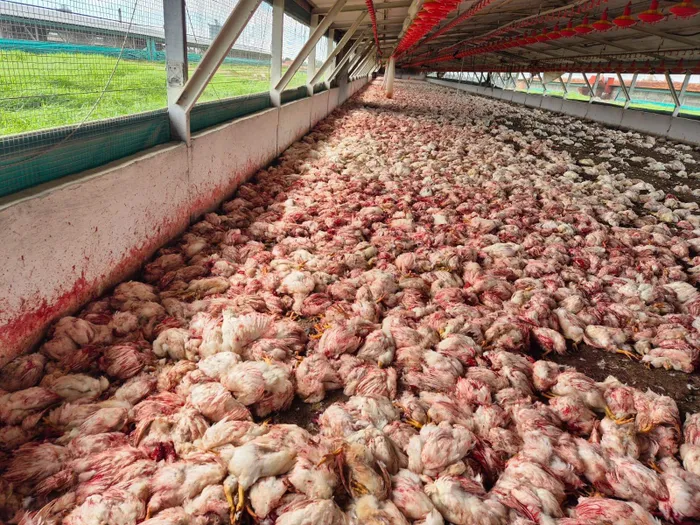
The National Council of the Society for the Prevention of Cruelty to Animals (NSPCA) this week reported that more than 1 million birds had been abandoned and it had culled more than 200 000 birds at a Daybreak contract grower who was without feed for days, resulting in mass cannibalism.
Image: NSPCA
THE National Council of SPCA’s (NSPCA) focus will now be on ensuring that Daybreak Foods complies with the final court interdict compelling the company to immediately cease all inhumane culling practices “including but not limited to the inhumane ringing of the breeder birds' necks”.
The animal welfare organisation secured a final interdict against the company on Friday following reports that Daybreak’s financial difficulties led to thousands of birds being inhumanly culled (by wringing their necks) and the fact that the chickens were left without any food, and/or left without specific food as needed.
Attached to the NSPCA’s founding affidavit were photographs and video footage of the mistreatment of the chickens. The photos displayed chickens with their intestines exposed, severely underfed chickens and heaps of dead chickens.
However Daybreak denied any inhumane treatment of chickens occurred, arguing that the injuries were probably due to the chickens pecking at each other’s wounds, which may have been caused by the chickens’ spurs, which is a natural reaction of the chicken.
According to Daybreak, the company was in a state of disrepair due to financial mismanagement.
“They further stated that the financial collapse led to employees not being paid, which in turn, led to casual workers being employed to take care of the chickens. There was neither the time nor the money to train the casual workers in every facet in a poultry production facility. Should any inhumane culling have taken place, it might have been due to inexperience or lack of training of the casual workers,” court papers read.
The Public Investment Corporation (PIC) then sprung into action, to provide Daybreak with funding in the amount of R74 million to salvage the situation and ensure that the chickens were properly taken care of and culled in a humane manner.
Daybreak then argued that the issue of casual workers had hence been resolved with the receipt of the funds and the trained full-time employees would return to work. The availability of the funds would also address the chicken food shortage.
Judge Frances Reid ruled: “I am satisfied that the NSPCA has a clear right to the relief sought, being confirmation of the rule nisi (interdict) to ensure that the animals at the (Daybreak) premises are treated humanely."
She ordered Daybreak to immediately: “Cease inhumane culling methods, including but not limited to the inhumane ringing of the breeder birds' necks. Feed all birds throughout its operations adequate and appropriate specific food (such as commercial poultry pellets for the breeder birds in this matter) until such time as the birds have been humanely processed. Until such time as the applicant is satisfied, alternatively until such time that the parties agree that there is sufficient, adequate and specie-appropriate nutritional feed at the farms and affiliated facilities of the first respondent, so that the birds on the farms are not compromised and neglected.”
The NSPCA said the court affirmed its legal right to intervene when animals suffer.
“Our teams were on the ground on the Daybreak Farms in Bela-Bela and Mookgopong, Limpopo for 12 days, confronting the grim realities these animals endure. The NSPCA extends heartfelt thanks to Advocate Samantha Martin and Gittins Attorneys for their exceptional legal support in securing this outcome. We will remain vigilant in ensuring Daybreak’s full compliance with the Court’s order and will continue to monitor the situation closely,” said NSPCA spokesperson, Jacques Peacock.
Daybreak did not respond to requests for comment by deadline.
Cape Times